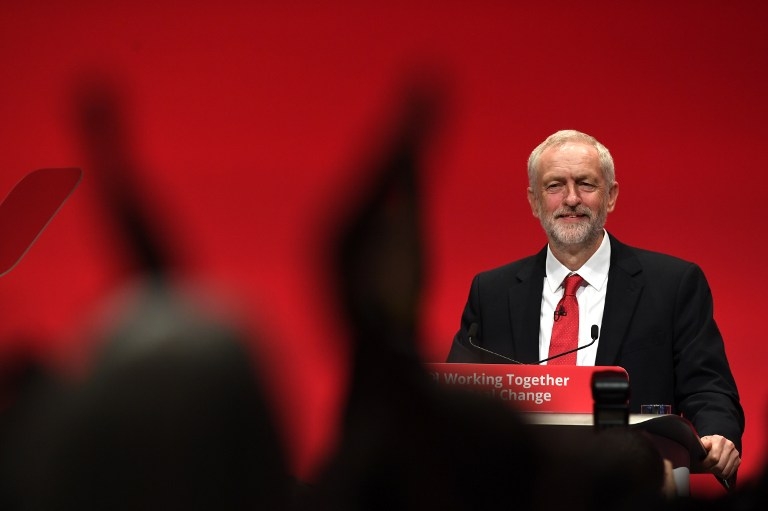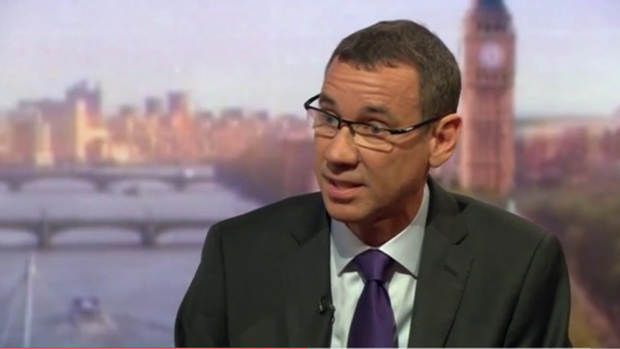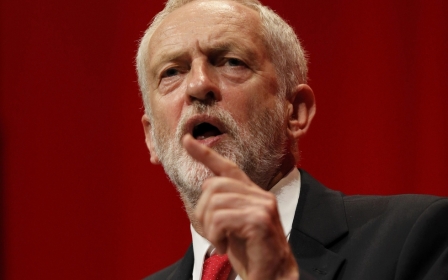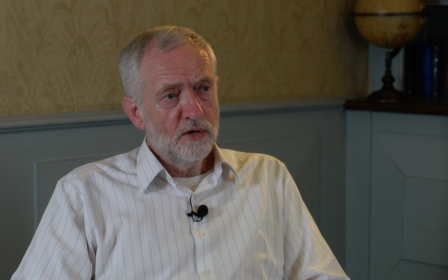Labour and Israel: Haaretz joined in the anti-Corbyn propaganda

The week we saw Donald Trump become President-elect of the United States – cheered on by the Ku Klux Klan, neo-Nazi organisations, and an "alt-right" campaign chief who has now been named a key adviser in the White House come January, a man whose news website promotes white supremacist ideas – the Haaretz weekend supplement chose to focus on allegations about anti-Semitism in Britain’s Labour Party under Jeremy Corbyn.
Editors of Israeli media would do well to instruct their reporters to stay away from embassy dinners, get out of London and ferret out some information for their readers on the reasons for Corbyn’s ascent
The subtitle of the article sounds like the tabloids ("Labour under Corbyn is reminiscent of a neo-Nazi party branch office"), alongside a photo of Corbyn standing on a balcony – in case the Israeli reader needs a visual reminder pairing Corbyn with our image of Hitler on that Wilhelmstrasse balcony.
The article’s author portrays the Liverpool conference at which Corbyn was chosen to lead his party as a fine example of the very arguments he is making about Corbyn and Labour.
Meanwhile, in reality, at the party conference this past September, Corbyn was re-elected by a large majority for the second time in a year. Nearly 80 percent of those eligible actually showed up to vote, and Corbyn won this time by nearly two-thirds of the votes cast.
What Corbyn said
Corbyn devoted his victory speech to his political vision, intended to offer an alternative to the approach of Conservatives David Cameron and Theresa May, but also to that of Labour’s Tony Blair and Gordon Brown. Corbyn talked about promoting new social and economic priorities that would, he said, benefit everyone.
He spoke about public housing in Britain and said that Labour would push for the construction of more than a million new homes, at least half of them council housing, along with rent control "so we can give every British family that basic human right – a decent home".
READ MORE: Middle East Eye meets Corbyn: The full interview
He also talked of investment in infrastructure, stating that a national investment bank should be established to channel £500bn into infrastructure and education. He talked about the role business owners can play in creating a more balanced society.
“But investment in capital," he said, "must include investment in human capital, the skilled workers needed to make our economy a success."Corbyn also said that if Labour is elected, it would raise corporate taxes by 1.5 percent to replace student loans for fees with state-funded grants. "Business shares in economic success," he noted, "so they ought also to contribute".
He criticised privatisation – from Margaret Thatcher’s policies, through Tony Blair’s and David Cameron’s, and on to Theresa May’s – saying that privatisation has damaged, and continues to damage, the nation’s health system and transportation system, leading to higher costs now than when the state ran them.
Speaking about foreign policy, Corbyn called for a different attitude toward migrants and asylum seekers. In conclusion, he addressed the accusations that the party is tolerant of anti-Semitism, saying that on this subject one must be very clear:
We know that robust debate has at times spilled over into abuse and hate around our party, including misogyny and anti-Semitism… That is utterly unacceptable. Our party must be a safe and welcoming space for everybody… Anti-Semitism is a terrible thing, it caused the most terrible crimes of the 20th century, every one of us has a responsibility to ensure that it is never allowed to fester in our society again.
The conference, let us remember, lasted three days, during which members of Corbyn’s shadow government talked about concrete steps for realising the vision termed by his close ally and shadow chancellor of the exchequer, John McDonnell, "socialism for the 21st Century".
Everything except substance
In the Haaretz article, the words "economic" and "social" do not appear, nor is there any mention of "education" or "investment" or "infrastructure" or "socialism" – not even once.
Nothing is said at all about the opinion of Corbyn, whom the article describes as the chief of a "neo-Nazi party branch office", concerning hate crimes.
Haaretz hopped on the Israeli disinformation bandwagon, dutifully reporting everything about the conference and Corbyn’s speech - except all the content of central importance
In other words, with regard to all the main subjects addressed by the Labour conference which was ostensibly the subject of the Haaretz article and likewise all the principal components of Corbyn’s vision, the issues that got him elected and on the basis of which Labour seeks to return to power, there was not a word about any of them, for the consideration of Haaretz readers, in the article. Not one word.
Haaretz, predictably, was not alone. While reports in the British press, which one can hardly accuse of excessive cordiality to Corbyn, were perhaps somewhat dry, the headlines in Israel dealt with other issues.
READ MORE: Goodbye New Labour: Victorious Corbyn consigns Blairism to history
The popular nrg website reported that "Many say they plan to leave the Labour Party after its re-election of Jeremy Corbyn, considered an anti-Semite and anti-Israeli"; Ynet posted that “Hamas’s friend appears to be on track for a decisive victory in the Labour election"; Mako (Israeli TV’s Channel 2 online) reported: "‘Friend’ of Hamas and Hezbollah Jeremy Corbyn elected to head Labour Party"; and nana10 (Channel 10 online) posted: "Staunch opponent of Israeli policy chosen to head Britain’s Labour Party."
Haaretz, as noted, hopped on the Israeli disinformation bandwagon, dutifully reporting to its readers everything about the conference and Corbyn’s speech except all the content of central importance.
Recycling claims
The background to the Haaretz article is a recycling of the claims raised in Dave Rich’s recent book: "The Left's Jewish Problem: Jeremy Corbyn, Israel and Anti-Semitism." The book is a popularisation of the author’s doctoral thesis about which we have unfortunately been unable to find out much.
In any case, Rich has already been given a platform at Haaretz to present his views in a March 2016 opinion piece, titled "The UK Labour Party Must Decide if it’s a Political Home for anti-Semites or for British Jews." Likewise, it is noteworthy that Rich is the director of communications fora charity providing security services to the Jewish community and documenting anti-Semitic incidents in England, a situation that, at least on its face, creates a conflict of interest between academic research and professional employment.
Leaving that aside, however, what is more troubling is the role played by a newspaper like Haaretz in uncritically disseminating these positions while ignoring all that was really central at the Labour conference.
Rich, let it be noted, is of course not alone. In August 2015, about a month before Corbyn was first elected to head Labour, Benjamin Netanyahu named long-time chief spokesman of the Prime Minister’s Bureau, Mark Regev, as Israel’s ambassador to Britain.
In his position as Israel’s ambassador in Britain, Regev diligently conflates every criticism of Israel with anti-Semitism, and calls for the excommunication of every Jewish organisation working against the occupation.
With Netanyahu-style verbal trickery and dark appeals to fear, so familiar to Haaretz readers but not to the British Jewish community, Regev suggests a link between the Labour Party and Hamas and anti-Semitism. "The Labour Party has an anti-Semitism problem," Regev told Haaretz about two months ago, signalling the embassy’s approach to silencing criticism of Israeli policy.
Eating away at quality
The journalistically dubious style adopted by the Israeli media in general in its coverage of Labour under Corbyn is nothing short of scandalous. Israeli media on this subject overall, and the latest coverage from Haaretz in particular, appear to have been cut from the same cloth, within the same confines of thought, bounded by a narrow discourse that precludes writing about what really happened.
Israeli propaganda, at all levels, has evidently succeeded in infiltrating everywhere, eating away at the ability of even an important newspaper like Haaretz to cover this subject
Evidently deeply impacted by the Israeli propaganda machine and by Regev’s own brand of packaging, this discourse appears repeatedly, with the latest Haaretz article indicative of the fall of an important intellectual bastion to the power of this onslaught.
The result is an absence of pertinent discussion of the positions of the Labour Party, as what is central is relegated to the margins, drowned out by a slew of half-truths, selective and misleading partial quotes, deliberate obfuscation and misdirection – all combining to create a distorted and deceptive picture of British politics.
Israeli propaganda, at all levels, has evidently succeeded in infiltrating everywhere, eating away at the ability of even an important newspaper like Haaretz to cover this subject.
Go to the source
Editors of Israeli media would do well to instruct their reporters and stringers to stay away from embassy dinners, get away from London and ferret out some information for their Israeli readers on the reasons for Corbyn’s ascent, for his enormous popularity within the party and for the antagonism his leadership evokes in the political elites and the wealthy.
A serious interview worthy of the name, one that is critical, even piercing, with Corbyn, could give readers the information they need to get to know and understand his positions, his worldview and his social and economic vision – which are what really will determine whether or not he is elected.
Such an interview would enable him to articulate his views on foreign policy, too – his opposition to the war in Iraq, to nuclear arms, to the bombing of Syria, and his insights concerning the Israeli-Palestinian conflict, which could be a good starting point.
Dave Rich, Mark Regev, and organisations with a right-wing agenda are unlikely to provide the Israeli reader, and especially Haaretz readers, with any of this crucial information.
A shorter version of this response appeared in the Haaretz weekend supplement of 25 November 2016 (Hebrew).
- Dr Tami Sarfatti is a historian; Dr Yoni Mendel is the Head of the Van Leer Center for Jewish-Arab Relations.
The views expressed in this article belong to the author and do not necessarily reflect the editorial policy of Middle East Eye.
Photo: Opposition Labour party leader Jeremy Corbyn speaks on the fourth day of the annual Labour Party conference in Liverpool, north west England on 28 September 2016 (AFP)
New MEE newsletter: Jerusalem Dispatch
Sign up to get the latest insights and analysis on Israel-Palestine, alongside Turkey Unpacked and other MEE newsletters
Middle East Eye delivers independent and unrivalled coverage and analysis of the Middle East, North Africa and beyond. To learn more about republishing this content and the associated fees, please fill out this form. More about MEE can be found here.





